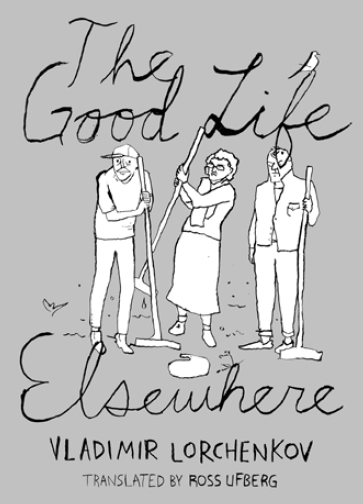Guys Like Me (16 page)
Authors: Dominique Fabre


We did hear from him, the following month. He'd sent Marco a letter. He was pleased to be living in Marseilles. What beat everything was that he'd immediately found a job, luck often waits until the last moment. He was taking care of a large house with a garden and swimming pool in a ritzy neighborhood. It just goes to show, it must have been in his genes, taking care of a house. He had quite a lot to do, which he liked. The owners were German, but that was another story! He was living in a studio apartment away from the main house, and he took care of the maintenance, the gardening, he was starting to feel more self-confident. And then there was the sea and the sun. He went to see his mother once a week, she'd aged a lot, they'd diagnosed the onset of Alzheimer's. He should have gone earlier. His handwriting was clear and well rounded, as if he hadn't yet reached our age but had stayed the way he'd been before, in high school, when we were twelve or thirteen. When I went back to his last address on my scooter, the family across the courtyard had gone. The mailboxes had been torn off and someone had dumped hundreds of leaflets from a nearby supermarket. The entrance hall smelled of urine. That's it, I told myself, it's over. I did what I'd wanted to do the time before, or even a long time earlier to tell the truth. I took several photos with my little digital camera and returned home. In the evening, I went to Brochant. Marie and I went for a walk, as far as Place de Clichy, she wanted to see the new titles in the window of the bookstore. This time I saw two guys turn to look at her, and I think she noticed, so that was fine.
When we're together, we never talk about the future. I try not to talk too much about my past either, about all those years spent waiting for her, but well, you know guys like me. The doctors seem pleased with themselves anyway. We invited Marco and Aïcha to Brochant, I did the cooking, we had a good laugh, Marie was sick as a dog again the next day, but it isn't serious, she said. I took some photos too. I e-mailed them to Ben, saying look, it'll soon be September in Paris, isn't life beautiful? I wasn't completely drunk when I wrote that. Aïcha talked for a long time with Marie about the organization where she worked, they might be able to do some things together. Later, Marco offered me a cigar. We went out on the little balcony because it stank. We talked a little about him. Nothing to report, he said. He had a big smile. We were both happy that evening. We talked about the others we'd lost contact with. We both agreed that when it came down to it, everyone was alone, after a certain number of years. And then we smoked without saying anything, above the noises of the boulevard. I continued with my rides.
I sent Jean photos of our school, lots of places where we'd been, buildings, cafés. I'd gone back to the Bar des Trois Communes, at the end of the bridge on the border of Asnières. The plaque of the two little girls killed by a reckless driver, with the bunches of flowers below. The black cars with front-wheel drive in the garage opposite, and the slightly ridiculous limousines, fluorescent pink and petroleum blue, in an obscure corner of the suburbs, near the Seine. The demolished apartment block where I'd lived as a small child, which was probably the one that meant the most to Marco, because we'd both grown up there. He gave me back the photos and said: it's funny, I couldn't do that, it really tears me up. Doesn't it affect you? I realized it did, thinking about it. But it did me good, and besides, doing this, I wasn't idle when I wasn't at work, waiting for Marie to recover completely. We came back with them. When they left, Marie asked me will you stay a while? We cleared the table and she started talking, she liked both of them, they seemed nice. Life could be normal every now and again. One last session to go, at Beaujon. She was scared every time. She was a little more scared, and she was expecting the worst. Or else, she'd completely forgotten and it was even harder to go back there. She didn't want to go back there, this evening. She didn't want to go to bed. She didn't want to. I said to Marie, I have an idea, are you coming? Let's go for a ride. I handed her a helmet, it was two o'clock in the morning. She'd ridden a motorbike before and she laughed because I'm not very expert. We took the Maréchaux toward Porte Maillot, it's the Way of the Cross for guys like me, and then we went to look at the Seine. We both love it. We were almost alone on the Pont Bineau. The reflections on the water were dark, almost proud, it seemed to be watching us, it was as if we could count on it and it would never abandon us. We parked on the sidewalk of the Pont Bineau. Marie held herself up against me, without saying anything, we turned north-east, toward Saint-Denis, it was funny how my whole life had been spent around that area, more or less. We looked in the direction of Beaujon too. It was a little cold on the bridge, so we went back. We couldn't keep from laughing. The following day, she got her bag ready at the last moment, and we went hand in hand to that horrible hospital, for the very last time, I swear. Oh, yes.

I went on with my life. Work, Marie in the evening, the photographs, the calls to Marco and my son. He was going to spend a few days in Jussieu and we decided we'd try to see each other. He was still just as badly dressed when I went to wait for him that evening at the bus stop near Porte d'Orléans. We had a beer in a brasserie, he looked at my scooter and said, you certainly took your time! Anaïs sent her love.
“How is she?”
“Well ⦠not too bad. It isn't always easy, you know.”
He was going to sleep at his mother's tonight.
“I brought the second helmet. Would you like me to give you a ride there?”
“Could you?”
“Sure,” I said to Benjamin, “why not?”
He had a backpack and a small bag, I managed to wedge the bag between my legs, and he carried the backpack on his shoulders. I'll give you directions, OK? We headed north. We passed through the Maréchaux, it was easy to ride in the bus lane, so why hesitate? After a while, he tapped me on the shoulder and we turned right, she was living in Les Lilas now, she had an apartment there. We rode easily, at Porte des Lilas there was a van full of cops and I was sure they were going to arrest us, but they didn't. We drove up toward the park next to the water tower. It was another world, where Ben's mother lived. I parked on her street, not right outside the building, I tried not to think about all those trains I'd waited for at the Gare de Lyon and the Gare Saint-Lazare, and I think I managed.
“Shit,” Benjamin said, “you certainly wouldn't win any races!”
I handed him his bag. He put it down on the sidewalk. I had my camera in my jacket pocket and he was standing in front of a large, more or less green willow, I felt like taking a photo. Really, he said, you want a picture of me? A guy was coming toward us. A tall black guy with headphones over his ears and huge sneakers.
“Excuse me,” my son said, “could you take a photo of us?”
The guy shrugged and made a face like an actor when he heard what Ben was saying, without the headphones. We both struck a pose in front of the big willow on that little street in Les Lilas next to the water tower and he said are you ready, is your Dad going to smile? Good, how about another one? He seemed to be having a good time, taking our photo. We said thanks, no worries, he said, and he patted his chest next to his heart, the way people used to do, forty years ago, but it had gone out of fashion in the suburbs and then a few years ago it came back, so there you are. He strode off. We looked at the three photos he'd taken, they aren't bad, are they, I'll send them to you.
“When are you back again?”
“Next month, Anaïs and I are coming for a few days.”
“We'll meet, right?”
“Can we crash at your place for one night?”
“Of course you can.”
I put my camera back in my jacket pocket and he handed me the helmet. I put it away in the little compartment where I also keep a map of the suburbs of Paris. Sometimes, in the evening, I take it up with me and decide on the places I could go and revisit, places I used to go with my mother, with friends, because of girls, and sometimes for no reason at all.
“I guess she's waiting for you?”
He nodded. “Yes, it's number twenty-three.”
He pointed to the little building where she lived. It was quite nice, I thought. Well, it wouldn't be long.
“Don't worry about it,” I said.
He seemed to find it hard to leave this time. Earlier, in the café, he'd told me a bit about his life in Zurich. But that wasn't really it. He put on that look I knew so well and asked me just after we hugged: by the way, how's Marie? Marie's a lot better, I told Ben, she's coming out tomorrow. He gave me a big smile.
“Say hello to her from us, we'll see her next month, OK?”
“Yes.”
At the intersection by the water tower I turned back towards him and he was still looking at me, he raised his hand. So did I. See you soon! He picked up his bag and turned right onto the little street where his mother lived. It wasn't bad around here, quiet, very green, just above the Bagnolet basin. I set off again, aiming for the Mercuriale towers at the junction of the A3 in order to get back on the Maréchaux. I'm going to print the photos. I have to call Marco later. I have a lot of things to do. Sometimes life rides along all by itself, there are several million of us like this, I'm riding, Marie's coming out tomorrow, I could ride for hours. I'm waiting for tomorrow. Well, there it is.
I C
ALLED
H
IM
N
ECKTIE
BY
M
ILENA
M
ICHIKO
F
LAÅ AR
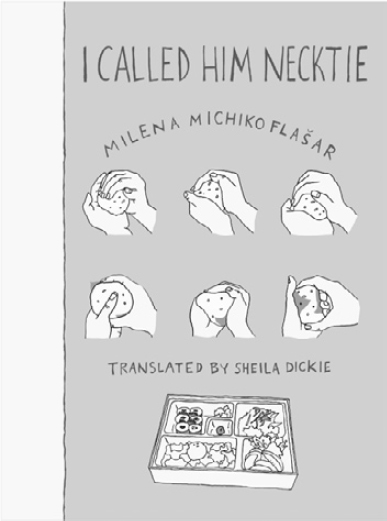
Twenty-year-old Taguchi Hiro has spent the last two years of his life living as a hikikomoriâa shut-in who never leaves his room and has no human interactionâin his parents' home in Tokyo. As Hiro tentatively decides to reenter the world, he spends his days observing life from a park bench. Gradually he makes friends with Ohara Tetsu, a salaryman who has lost his job. The two discover in their sadness a common bond. This beautiful novel is moving, unforgettable, and full of surprises.
http://newvesselpress.com/books/called-necktie/
W
HO IS
M
ARTHA
?
BY
M
ARJANA
G
APONENKO
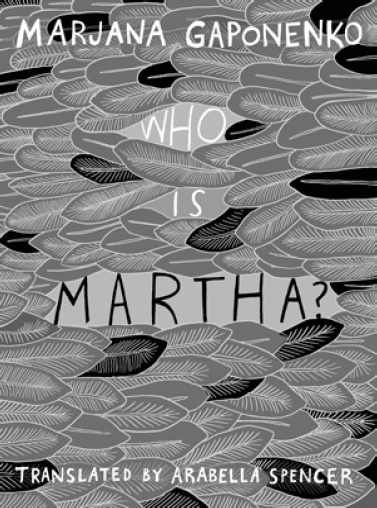
In this rollicking novel, 96-year-old ornithologist Luka Levadski foregoes treatment for lung cancer and moves from Ukraine to Vienna to make a grand exit in a luxury suite at the Hotel Imperial. He reflects on his past while indulging in Viennese cakes and savoring music in a gilded concert hall. Levadski was born in 1914, the same year that Marthaâthe last of the now-extinct passenger pigeonsâdied. Levadski himself has an acute sense of being the last of a species. This gloriously written tale mixes piquant wit with lofty musings about life, friendship, aging and death.
http://newvesselpress.com/books/martha/
A
LL
B
ACKS
W
ERE
T
URNED
BY
M
AREK
H
LASKO
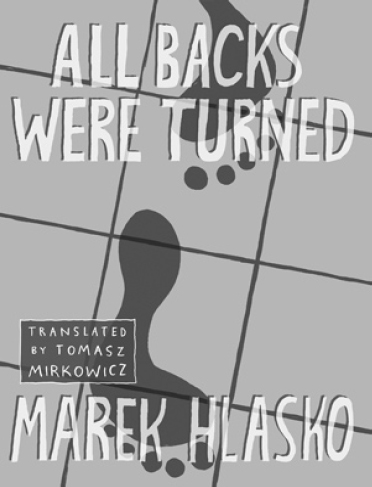
Two desperate friendsâon the edge of the lawâtravel to the southern Israeli city of Eilat to find work. There, Dov Ben Dov, the hand-some native Israeli with a reputation for causing trouble, and Israel, his sidekick, stay with Ben Dov's younger brother, Little Dov, who has enough trouble of his own. Local toughs are encroaching on Little Dov's business, and he enlists his older brother to drive them away. It doesn't help that a beautiful German widow is rooming next door. A story of passion, deception, violence, and betrayal, conveyed in hardboiled prose reminiscent of Hammett and Chandler.
http://newvesselpress.com/books/backs-turned/
K
ILLING
A
UNTIE
BY
A
NDRZEJ
B
URSA
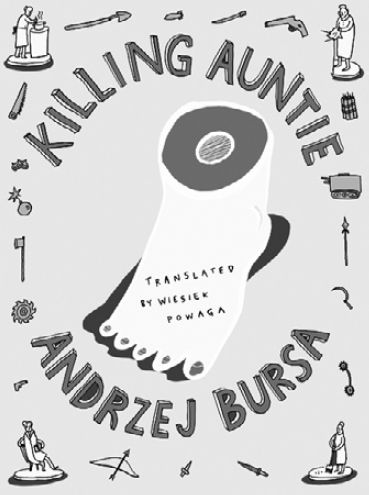
A university student named Jurek finds himself with nothing to do. After his doting aunt asks the young man to perform a small chore, he decides to kill her for no good reason. This short comedic masterpiece combines elements of Dostoevsky, Sartre, Kafka and Heller to produce an unforgettable tale of murder andâjust maybeâredemption.
http://newvesselpress.com/books/killing-auntie/
A
LEXANDRIAN
S
UMMER
BY
Y
ITZHAK
G
ORMEZANO
G
OREN
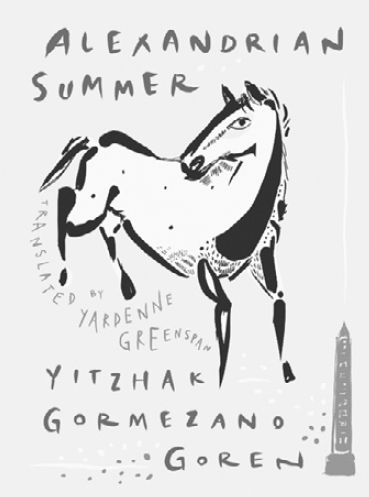
This is the story of two Jewish families living their frenzied last days in the doomed cosmo-politan social whirl of Alexandria just before fleeing Egypt for Israel in 1951. The conventions of the Egyptian upper-middle class are laid bare in this dazzling novel, which exposes sexual hypocrisies and portrays a vanished polyglot world of horse-racing, seaside promenades and nightclubs.
http://newvesselpress.com/books/alexandrian-summer/
C
OCAINE
BY
P
ITIGRILLI
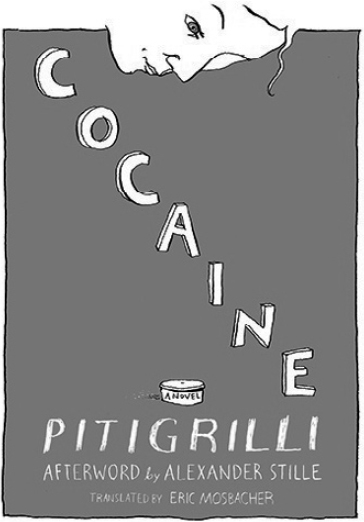
Paris in the 1920s â dizzy and decadent. Where a young man can make a fortune with his wits ⦠unless he is led into temptation. Cocaine's dandified hero Tito Arnaudi invents lurid scandals and gruesome deaths, and sells these stories to the newspapers. But his own life becomes even more outrageous when he acquires three demanding mistresses. Elegant, witty and wicked, Pitigrilli's classic novel was first published in Italian in 1921 and retains its venom even today.
http://newvesselpress.com/books/cocaine/
S
OME
D
AY
BY
S
HEMI
Z
ARHIN
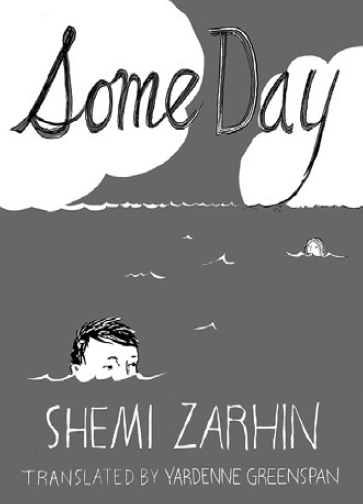
On the shores of Israel's Sea of Galilee lies the city of Tiberias, a place bursting with sexuality and longing for love. The air is saturated with smells of cooking and passion. Some Day is a gripping family saga, a sensual and emotional feast that plays out over decades. This is an enchanting tale about tragic fates that disrupt families and break our hearts. Zarhin's hypnotic writing renders a painfully delicious vision of individual lives behind Israel's larger national story.
http://newvesselpress.com/books/some-day/
T
HE
M
ISSING
Y
EAR OF
J
UAN
S
ALVATIERRA
BY
P
EDRO
M
AIRAL
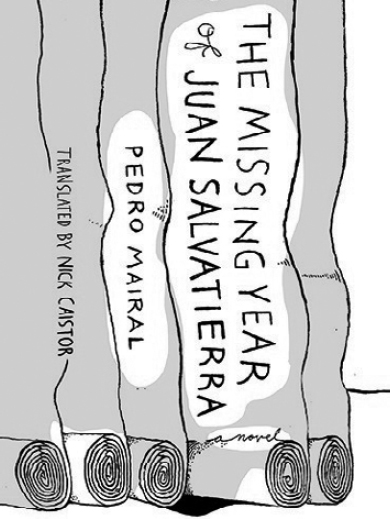
At the age of nine, Juan Salvatierra became mute following a horse riding accident. At twenty, he began secretly painting a series of canvases on which he detailed six decades of life in his village on Argentina's frontier with Uruguay. After his death, his sons return to deal with their inheritance: a shed packed with rolls over two miles long. But an essential roll is missing. A search ensues that illuminates links between art and life, with past family secrets casting their shadows on the present.
http://newvesselpress.com/books/the-missing-year-of-juan-salvatierra/
T
HE
G
OOD
L
IFE
E
LSEWHERE
BY
V
LADIMIR
L
ORCHENKOV
